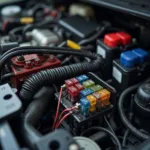Maintaining your car’s air conditioning system is crucial for a comfortable driving experience, especially during hot weather. One vital component that keeps your AC running smoothly is the condenser. If you’re experiencing issues with your car’s cooling system, a faulty condenser might be the culprit. This comprehensive guide delves into everything you need to know about car air conditioning condenser repair, empowering you to make informed decisions about your vehicle’s maintenance.
What is a Car Air Conditioning Condenser?
The condenser plays a critical role in your car’s air conditioning system. It’s responsible for transforming refrigerant from a high-pressure, high-temperature gas into a high-pressure, low-temperature liquid. Imagine it as the system’s radiator, expelling heat absorbed from inside your car to the outside environment.
How Does a Car Air Conditioning Condenser Work?
The process begins when the AC compressor pressurizes and heats gaseous refrigerant. This hot gas then flows into the condenser, typically located at the front of your vehicle, just behind the grille. As the hot refrigerant travels through the condenser’s thin tubes and fins, it releases heat to the surrounding air, aided by the condenser fan. This heat exchange causes the refrigerant to condense into a high-pressure liquid, ready to absorb more heat from the car’s interior.
Common Signs of a Failing Condenser
Identifying a failing condenser early is essential to prevent further damage to your AC system. Here are some telltale signs to watch out for:
- Warm Air from AC Vents: The most obvious sign is warm air blowing from your vents even when the AC is on full blast.
- Fluctuating Air Temperature: If the air temperature inconsistently alternates between cool and warm, it could indicate a condenser issue.
- Refrigerant Leak: A leaking condenser can result in low refrigerant levels, leading to reduced cooling efficiency.
- Sweet Smell: A sweet, unusual odor emanating from your AC vents could signal a refrigerant leak.
- Visible Damage: Inspect the condenser for any physical damage such as dents, cracks, or bent fins, which can compromise its performance.
Causes of Car Air Conditioning Condenser Failure
Several factors can contribute to a failing condenser:
- Road Debris: Since the condenser sits at the front of your car, it’s vulnerable to damage from road debris like rocks, gravel, and even insects.
- Corrosion: Exposure to road salt, moisture, and chemicals can lead to corrosion, weakening the condenser and causing leaks.
- Age and Wear: Like any car component, condensers have a lifespan and can deteriorate over time due to constant exposure to heat and pressure.
- Vibrations: Excessive engine vibrations can put stress on the condenser and its connections, potentially leading to leaks or damage.
- Improper Maintenance: Neglecting regular AC system checks and refrigerant top-ups can contribute to condenser problems.
Car Air Conditioning Condenser Repair Options
If you suspect a condenser issue, it’s crucial to consult a qualified mechanic specializing in car air conditioning repair. They can accurately diagnose the problem and recommend the best course of action:
- Repair: In some cases, minor leaks or damage to the condenser can be repaired. This might involve patching small leaks or replacing damaged fins.
- Replacement: If the damage is extensive or the condenser is beyond repair, a complete replacement is often necessary.
Car Air Conditioning Condenser Repair Cost
The cost of car air conditioning condenser repair can vary widely depending on several factors:
- Make and Model: Condenser costs differ based on the car’s make and model.
- Repair vs. Replacement: Repairing a condenser is usually cheaper than a complete replacement.
- Labor Costs: Labor charges vary depending on the mechanic’s location and expertise.
- Additional Repairs: If other AC components are also damaged, it will increase the overall repair cost.
Preventing Car Air Conditioning Condenser Problems
While not all condenser issues are preventable, you can take proactive measures to extend its lifespan:
- Regular Inspections: Have your AC system inspected annually by a qualified mechanic, especially before the start of summer.
- Clean the Condenser: Regularly clean the condenser fins using a soft brush or compressed air to remove debris and dirt.
- Address Leaks Promptly: If you suspect a refrigerant leak, have it addressed by a professional immediately.
- Avoid Driving on Rough Roads: Whenever possible, avoid driving on rough or unpaved roads to minimize the risk of debris damage.
Conclusion
A properly functioning car air conditioning condenser is essential for a comfortable driving experience. By understanding the signs of a failing condenser, common causes, and preventive measures, you can address issues promptly and prolong the life of your AC system. Remember, seeking professional help from qualified mechanics specializing in car air conditioning repair is always the best approach to ensure optimal performance and avoid costly repairs down the road.
Looking for reliable car air conditioning repair services? Check out our recommended specialists in your area:
car air conditioning repair darlington, car air conditioning repair northampton, car air conditioning repair swansea, car air conditioning repair colchester, car air conditioning repair northallerton.



